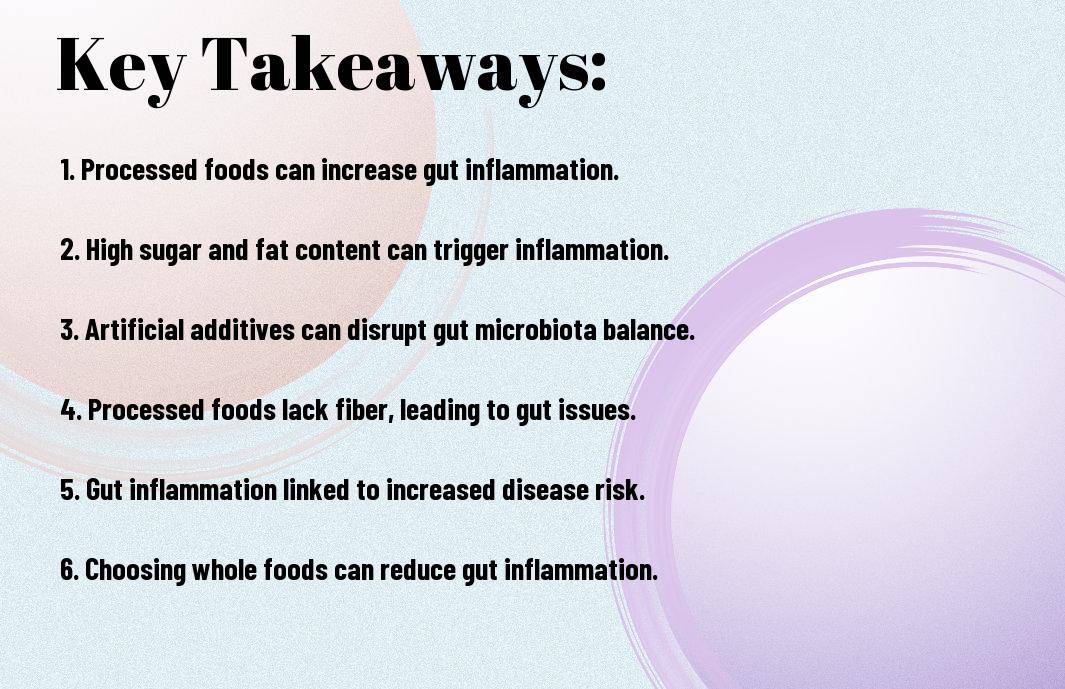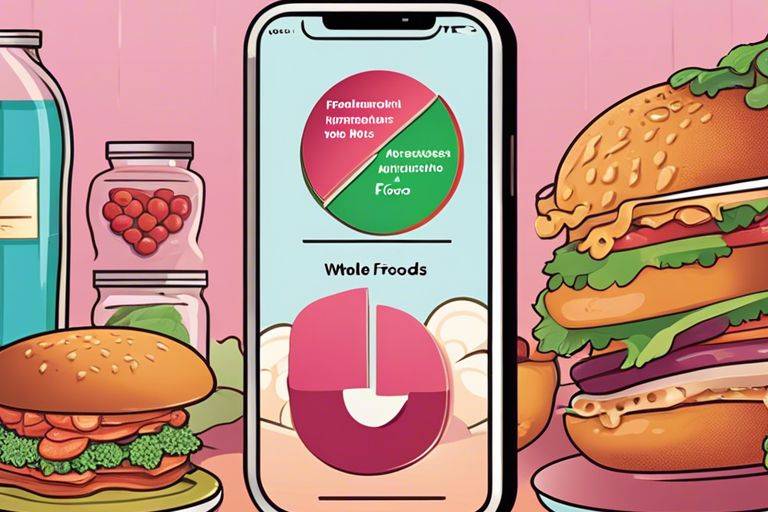
Newsletter Subscribe
Enter your email address below and subscribe to our newsletter

Enter your email address below and subscribe to our newsletter

There’s a growing body of research indicating that processed foods can have a detrimental effect on gut inflammation. When you consume foods high in sugar, unhealthy fats, preservatives, and artificial additives, it can disrupt the balance of good bacteria in your gut, leading to inflammation. This inflammation has been linked to a host of health issues, including digestive disorders, obesity, and even autoimmune diseases. It’s important to be mindful of the impact processed foods can have on your gut health and opt for whole, unprocessed foods whenever possible for a healthier microbiome.


To understand the impact of processed foods on gut inflammation, we need to probe into their historical significance. Foods that underwent processing, like canning and refining, gained popularity during the Industrial Revolution for their longer shelf life and convenience.
Despite their historical roots, processed foods have continued to dominate modern diets due to their convenience factor. With our hectic lifestyles, quick meals and snacks that are easy to prepare have become a necessity.
Processed foods are designed to be hyper-palatable, containing high levels of sugar, salt, and unhealthy fats to entice our taste buds and trigger addictive eating behaviors. Additionally, the packaging and marketing of these products make them easily accessible and appealing to consumers, further contributing to their widespread consumption.

If you are interested in learning more about the impact of processed foods on gut inflammation, I highly recommend checking out the article on Effects of ultra-processed foods on the microbiota-gut ….
The gut microbiome refers to the trillions of microorganisms living in our digestive tract. These microbes play a crucial role in various bodily functions, such as digestion, nutrient absorption, and even immune system regulation.
Defining the gut microbiome as a complex ecosystem highlights its significance in maintaining overall health. Imbalances in the gut microbiota can lead to inflammation, digestive disorders, and even impact mental health.
Understanding the crucial role the gut microbiome plays in our well-being emphasizes the need to prioritize foods that support a healthy balance of gut bacteria. Incorporating fiber-rich fruits and vegetables, fermented foods, and prebiotics into your diet can help nourish your gut microbiota and promote overall health.

For the latest research on the impact of processed foods on gut health, a study published in the journal of Ultra-processed foods and food additives in gut health and … sheds light on the connection between processed foods and gut inflammation.
An vital aspect to consider in processed foods is the abundance of additives and preservatives. These substances can disrupt the balance of good bacteria in your gut, leading to gut inflammation and potential health issues.
On the other hand, refined carbohydrates found in processed foods can actually fuel inflammation in the body. These carbohydrates are quickly broken down into sugar, causing spikes in blood sugar levels and contributing to chronic inflammation which is linked to various diseases.
Foods high in refined carbohydrates often lack vital nutrients and fiber, further exacerbating the inflammatory response in the gut. Limiting processed foods rich in refined carbohydrates can help you maintain a healthy gut and reduce the risk of inflammation-related illnesses.
Once again, let’s explore into the repercussions of gut inflammation stemming from the consumption of processed foods. This internal upheaval can wreak havoc beyond just your digestive system, leading to a cascade of health issues that can significantly impact your overall well-being.
On the forefront of the battle against gut inflammation are chronic diseases like diabetes, obesity, and heart disease. These conditions are not just isolated incidents but are intricately linked to the health of your gut. The inflammation caused by processed foods can exacerbate these ailments, leading to a vicious cycle of declining health.
Consequences of gut inflammation extend beyond physical health to mental well-being, highlighting the intricate relationship between the gut and the brain. The gut-brain axis plays a crucial role in regulating mood, and disruptions in gut health can contribute to the development of mood disorders such as anxiety and depression.
To dive deeper, the gut-brain axis is a bidirectional communication system between the central nervous system and the gut microbiome. This complex network influences various aspects of brain function, including stress response, emotions, and even cognition. Imbalances in the gut can potentially disrupt this delicate equilibrium, impacting your mental health in profound ways.
For the processed food industry, manipulating nutrition labels is a common deceptive marketing tactic. They often highlight misleading claims such as “low-fat” or “sugar-free” while loading the product with hidden sugars or unhealthy fats. This deceptive practice can mislead consumers about the actual nutritional content of the product, leading them to believe they are making a healthier choice when they are not.
Regulations play a crucial role in ensuring the quality and safety of our food supply. However, the processed food industry often lobbies for lenient regulations that favor their bottom line over consumer health. By influencing policies and regulations, they can continue to use cheap, subpar ingredients and additives that contribute to gut inflammation and other health issues.
This industry’s influence on policy can have far-reaching consequences, as it perpetuates the cycle of unhealthy eating habits and contributes to the rising rates of chronic diseases linked to poor diet choices. Consumers must stay informed and advocate for stricter regulations to promote a healthier food environment for all.
One way to break the cycle of gut inflammation caused by processed foods is to embrace whole foods. By choosing nutrient-dense, unprocessed foods like fruits, vegetables, whole grains, and lean proteins, you provide your body with the necessary vitamins, minerals, and antioxidants it needs to thrive.
Foods play a vital role in breaking the cycle of gut inflammation. By incorporating more whole foods into your diet, such as fresh produce, nuts, seeds, and lean meats, you can fuel your body with the necessary nutrients to support gut health and reduce inflammation. Simple meal prepping and cooking at home can help you avoid processed foods and take control of what you put into your body.
Embracing a diet rich in whole foods not only supports gut health but also provides necessary nutrients that can help reduce inflammation and support overall well-being. By focusing on fresh, unprocessed ingredients and incorporating simple cooking and meal prep strategies into your routine, you can take positive steps towards breaking the cycle of gut inflammation caused by processed foods.
With this in mind, it is crucial to be mindful of the impact processed foods can have on gut inflammation. By choosing whole, unprocessed foods and incorporating more fruits, vegetables, and fiber into your diet, you can help promote a healthier gut environment and reduce inflammation. Recall, what you eat plays a significant role in your overall health, so make choices that support your well-being.
A: Processed foods are foods that have been altered from their natural state through various methods such as freezing, canning, baking, and drying.
A: Processed foods often contain high levels of additives, preservatives, and artificial ingredients which can disrupt the balance of bacteria in the gut, leading to inflammation.
A: Examples include sugary snacks, fried foods, processed meats, sugary drinks, and foods high in trans fats.
A: Gut inflammation has been linked to various health conditions such as irritable bowel syndrome, leaky gut syndrome, autoimmune disorders, and even mental health issues like depression and anxiety.
A: You can reduce gut inflammation by incorporating more whole foods like fruits, vegetables, whole grains, and lean proteins into your diet, and by limiting your intake of processed foods.
A: Not all processed foods are bad for gut health. Some processed foods, like fermented foods (e.g. yogurt, kefir, sauerkraut), can actually promote a healthy gut microbiome.
A: Some tips include reading food labels carefully, cooking meals from scratch using whole ingredients, meal prepping to avoid relying on convenient processed foods, and being mindful of portion sizes and balance in your diet.